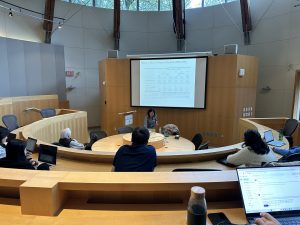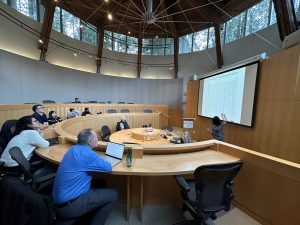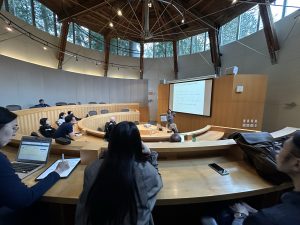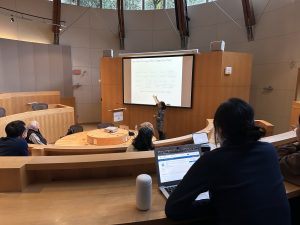- Title: Shadow of Authoritarian Patronage in Democratizing South Korea
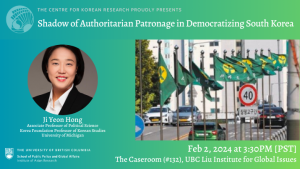
- Date: Friday, Feb 2nd, 2024
- Time: 3:30-5:00PM (PST)
- Location: The Case Room (Room 132), UBC Liu Institute for Global Issues
- Speaker: Dr. Ji Yeon Hong (Associate Professor of Political Science, Korea Foundation Professor of Korean Studies at University of Michigan)
- Bio: Ji Yeon (Jean) Hong is a political scientist working on the political economy of authoritarianism, with particular attention to East Asia. Dr. Hong is an Associate Professor of Political Science at the Department of Political Science and Korea Foundation Chair Professor of Korean Politics at the Nam Center for Korean Studies, International Institute, University of Michigan. She has various ongoing research projects related to the legacy of the authoritarian past, the long-term impact of political violence, and the determinants of elite behavior and government policies under authoritarianism. Her research has been published or is forthcoming in the American Journal of Political Science, British Journal of Political Science, Journal of Economic Behavior and Organization, Journal of Politics, and Political Science Research and Methods among others.
- Abstract: Many authoritarian leaders build strong bonds with certain groups and people. Such authoritarian patronage often affects the country’s politics even after the end of the dictatorship. This study looks at how authoritarian patronage between rural village leaders and an authoritarian regime influenced voting in both authoritarian and democratic elections using the case of the New Village Movement under Park Chung-hee in South Korea. It suggests that the influence of these old ties remained effective in elections during authoritarian periods and even after the country became democratic in 1987, but only if people still trusted these bonds. However, as democracy consolidated and the agricultural sector declined due to globalization, this influence eventually faded away. The study shows that the legacy of authoritarianism is not simply an outcome of a strong dictatorship but is reshaped with political and economic changes in a new democracy.

